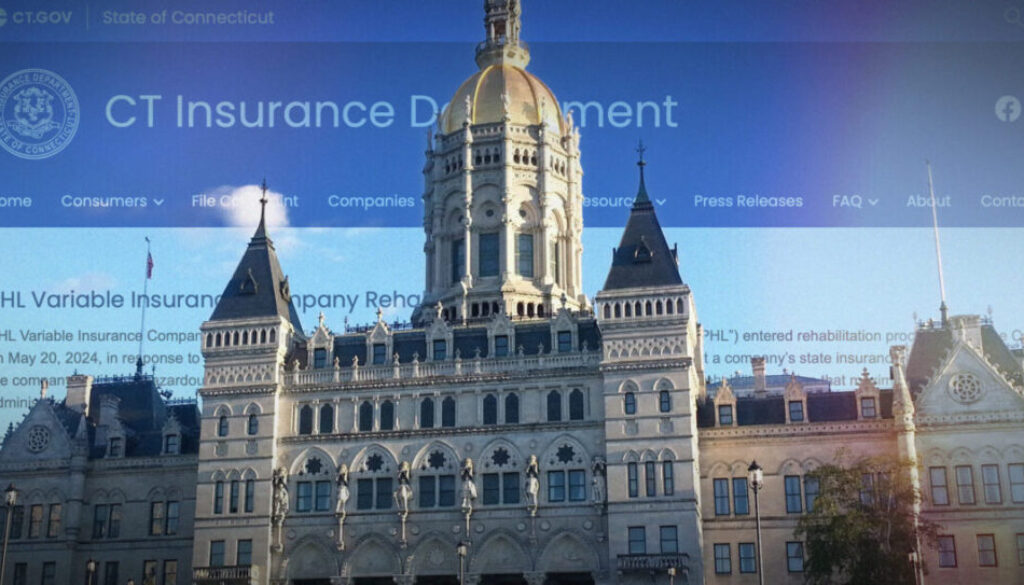Conn. regulators ask judge to reject ‘setoff rights’ for PHL Variable premium

Connecticut Insurance Department regulators are headed back to court in their ongoing effort to rehabilitate the financially troubled PHL Variable Insurance Co.
In May 2024, Insurance Commissioner Andrew Mais introduced the moratorium on benefits payments until a Connecticut court approves a rehabilitation plan for the financially troubled PHL Variable.
Since then, policyholders filed several legal challenges seeking to weaken the moratorium. The case involves nearly 100,000 policyholders nationwide and over $5 billion in policyholder liabilities, court documents say.
PHL subsidiaries Concord Re, Inc., and Palisado Re, Inc. were also placed into rehabilitation.
PHL issued life insurance and annuity products and related supplemental contracts to policyholders nationwide. Concord and Palisado are captive insurers whose only business is the reinsurance of PHL’s liabilities.
Mais filed the petition to put the companies into rehabilitation after determining that they were in a hazardous financial condition and that other alternatives had been exhausted. Some analysts predicted that the takeover of PHL Variable would rock the industry.
Arguing for ‘setoff rights’
In December, a group of investors owed more than $40 million in combined benefits from several PHL Variable policies filed a motion to intervene. Those plaintiffs are concerned about “setoff rights,” in this case the right to use unpaid benefits to satisfy premium owed.
CID rejected setoff rights for those policyholders in the PHL Variable case.
“Connecticut law allows Policy Owners to use their unpaid death benefit claims against PHL as credit to satisfy their premium obligations to PHL as they come due under the terms of other in-force life insurance policies,” reads the motion filed by Broadriver Asset Management, Carlisle Management Co. and Leargas Capital.
In an April 3 response, the CID and Mais urged the court to reject the claims made by the investors.
“The Investors’ reading of the Moratorium Order is a fiction of their own creation,” CID wrote. “The Rehabilitator has never taken the position that the Moratorium Order overrides provisions in PHL policies that give policyholders the option to stop paying premiums.
The moratorium order states that “all policyholders shall make the minimum periodic premium payments as provided in the terms of their policy.”
In the 10 months following the moratorium, “many PHL policyholders” elected to stop paying premiums and either allowed their policies to lapse or sought payments for the applicable surrender value, CID noted.
“The Rehabilitator has not pursued and cannot pursue those policyholders to compel them to make premium payments based upon any language in the Moratorium Order,” the response reads. “Because payment of such premiums is optional on the part of the policyholder, they are not a ‘debt’ or a ‘credit’ against which the Investors can seek to offset their unpaid death benefits.”
‘An escalating inequity’
In a second motion to intervene, a pair of PHL Variable policyholders are asking the court to reconsider the $300,000 moratorium on benefits created by Mais and CID.
Dana Montana and Dennis DeGori both own Phoenix Protector Universal Life II policies with death benefits well in excess of the $300,000 limit. Montana and DeGori called the moratorium “an escalating inequality.”
“Individuals with a death benefit below $300,000 suffer none of the consequences of the injunctive order while [Montana and DeGori] suffer a very significant diminution in their benefit,” the motion reads. “This inequity is made worse as those policies that paid in the most and have the least to do with the insolvency will suffer the most.”
Montana and DeGori are co-owners of Stone Park Entertainment, described in court documents from a previous lawsuit as a Stone Park, Illinois corporation and home to Scores, an “adult entertainment establishment.”
Montana, 82, purchased her policy on Oct. 15, 2004, the motion says. Her death benefit is $6 million and her monthly premium is $9,943. The cash surrender value of her policy is “in excess of $800,000,” the motion states, with Stone Park Entertainment as the beneficiary. DeGori holds a policy with a death benefit of $4 million.
“Montana and DeGori each purchased policies with PHL as an instrument to purchase the other’s interest in Stone Park,” the motion reads.
The policyholders want the moratorium order amended “to address the varying classes of policies,” the motion says. “[The] Rehabilitator fails to consider the value of different policy types, the cash value of various policies, and the varying amounts of payments policyholders are required to make to obtain the same $300,000 of coverage.”
© Entire contents copyright 2025 by InsuranceNewsNet.com Inc. All rights reserved. No part of this article may be reprinted without the expressed written consent from InsuranceNewsNet.com.
The post Conn. regulators ask judge to reject ‘setoff rights’ for PHL Variable premium appeared first on Insurance News | InsuranceNewsNet.





